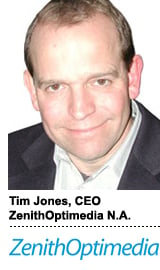 Media agencies have more influence than ever, thanks to the runaway train of audience fragmentation and the infrastructure/manpower needed to address it. This trend is nicely articulated by Publicis Groupe’s acquisition of digital agency Engauge Marketing – not because Engauge is a digital media agency (it’s not) but rather because it’s a creative and content-centric shop that will henceforth report up through a media agency.
Media agencies have more influence than ever, thanks to the runaway train of audience fragmentation and the infrastructure/manpower needed to address it. This trend is nicely articulated by Publicis Groupe’s acquisition of digital agency Engauge Marketing – not because Engauge is a digital media agency (it’s not) but rather because it’s a creative and content-centric shop that will henceforth report up through a media agency.
Columbus, OH-based Engauge will be housed within Publicis’ ZenithOptimedia and aligned with Atlanta-based digital agency Moxie. Moxie already has some display, video and search media capabilities in-house. Engauge is considered strong in social presence and content strategy. That represents an upsell opportunity for Engauge clients like Cisco Systems and Nationwide – but also a broadening of Zenith’s overall capabilities to include service components not typically associated with a media network.
Engauge’s alignment with Zenith suggests that Publicis sees value in building out capabilities at its media hubs – the other big one is Starcom MediaVest Group – to supplement the bread and butter media planning and buying. It could as easily have placed Engauge under flagship creative network Saatchi & Saatchi, but it didn’t.
“It’s not that the media agency is taking the lead – there’s a rebalancing,” said Tim Jones, CEO of ZenithOptimedia North America, in an interview. “For those clients where we’re providing both media and digital creative, I’d say we’re at the table as equal partners with the creative agency.”
For instance, Jones said Zenith was one of only three agencies asked to attend an upcoming meeting with the CMO at an unnamed client. The other two were Moxie and a creative agency. “Three years ago there might have been just creative agency to start,” he said.
In other cases, Zenith has taken the lead on a campaign, either because the lead creative shop is based in another country, or because the creative assignment is in review. These small changes point to a larger reality: the center of gravity in marketing services is moving away from creative shops and toward the media agencies, consultants, and enterprise technology players. Yes, to some extent the creative agency is at risk of becoming a point solution.
Jones said he doesn’t want Zenith to be seen as a threat to traditional ad agencies, which is understandable. After all, he partners internally with Saatchi and Leo Burnett, externally with rival holding companies (including soon-to-be sister agencies at Omnicom Group, like BBDO and TBWA) and independents like Goodby Silverstein & Partners.
“Do I think eventually we’ll be doing big idea development?” Jones said. “The answer is no – that’s a different agency construct. That’s not where we want to play.”
Rather he sees synergies between the “big idea” and cost and infrastructure expertise supplied by the media network.
“There’s a tremendous opportunity to take the great idea platform and drive that through into all these other touch points,” he said. “Playing off that creative platform is where I think the future is. Yes, that we have a Moxie and Engauge really helps us talk to clients about fulfilling that need — whether that’s short form video, whether that’s putting together a sweepstakes, whether that’s a mobile campaign or mobile website.”
Deal Notes
Coming in the wake of Publicis’ proposed merger with Omnicom Group, the Engauge buy is something like competitive eater Joey Chestnut’s first tentative snack after recovering from his victory at the Coney Island hot dog contest earlier this summer.
That deal — which still needs to clear regulatory hurdles in the U.S., France and elsewhere — will create the world’s largest agency conglomerate with a market cap estimated at $35 billion. To draw an unfair comparison, that’s one whole eighth of a Google.
Publicis’ Engauge buy, terms of which were not disclosed, amounts to a drop in that very large bucket. The Midwestern agency was formed in 2007 through a roll-up of three firms: digital agency Spunlogic, CRM/data firm Direct Impact, and Columbus-based Ten United. Engauge was acquired from majority owner Halyard Capital, which has reportedly been shopping the agency for some months. Engauge/Moxie together employ more than 600 in creative, social, media, and data/analytics capabilities.











